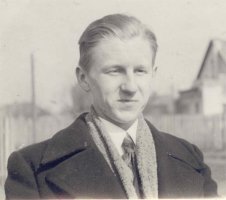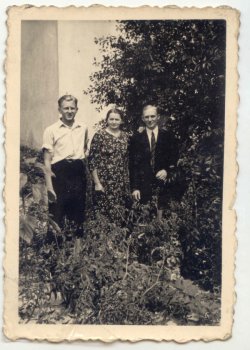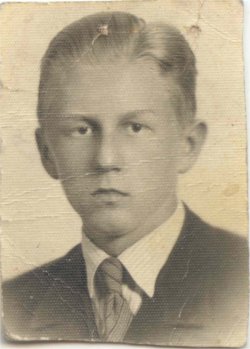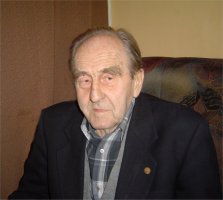The insurgent accounts of witness
Jan Romanczyk "Łata" (= a patch) - the boy from "Miotła" (= a broom)
Occupation
 |
Jan Romanczyk
born on the 1st of May 1924 in Wolomin
sergeant cadet of Home Army
pseud. "Łukasz Łata" (= Lucas the Patch)
Kedyw of the Main Headquarters of Home Army
"Torpeda" (= a torpedo) Platoon, "Miotła" (= a broom) Battalion
"Radoslav" Grouping
|
The beginning of the drama
In 1938 I was a second-form pupil of the Public Secondary School named after Tomasz Zan in Pruszkow. It was the secondary school habit that every classroom should be decorated in some style. Our class I b in September 1939 unanimously chose the military style. We established that the upper ending of the border classroom walls would be decorated by a handmade paper ribbon of the Order of Military Virtue, and on the walls there will be hung pictures, or reproductions on the Polish Army. For sure the reason for that choice was the situation in the world. In March 1938 there took place the annexation of Austria by the Nazi Germany. On the 30th of September 1938 there was a treaty in Munich concluded among Germany, Italy, the Great Britain and France without the participation of Czechoslovakia that allowed Germany to occupy some part of Czech.
On the treaty grounds Germany annexed Sudety to the German Reich. At the same time they created the Protectorate of Bohemia and Moravia. Poland regained Slask Zaolzie that on the strength of a local agreement from the 5th of November 1918 was granted to Poland. Czechs in January 1919 occupied it by force. Then the plebiscite was to have taken place, but because of Poland involvement in 1920 in the war with Bolsheviks the issue subsided and Zaolzie stayed with Czechs. Germans on the strength of the Munich Pact created also a pro-German country Slovakia under the leadership of Prince Joseph Tiso.
In 1939 carrying the politics of "Drang nach Osten" the German laid claims against our country demanding extraterritorial corridor through the land of Poland connecting East Prussia with Germany and acknowledging the Free City of Danzig as a German one. In March 1939 the Minister of Foreign Affairs of Poland Jozef Beck, categorically refused on the behalf of Polish Nation to agree for the German claims. We gathered in the school hall. there we listened to the expose of the Minister Jozef Beck. The international situation was becoming more and more exacerbated. Germans were striving after the war.
In August 1939 the treaty on the future partition of Poland was signed by Molotov (the USSR) and Ribbentrop (Germany). At the same time Poland signed a treaty on mutual support with France and the Great Britain. In the country one was preparing for the war imposed by the German. The western countries advised Poland to limit the preparations so as not to provoke the German. Out of local civilians there were organized units of OPL (the Unit Aircraft Defence). It was advised to dig the anti-aircraft ditches. People were preparing food reserves. Windows were blacked out.
On Friday, 1st September 1939 German soldiers crossed Polish borders - the World War the Second broke up. We all were brought up in the spirit of patriotism and we realized how heavy losses were suffered by our nation in the years 1914-1920 freeing themselves from a long-lasting bondage from the invaders' hand. This was the reason we received the Minister Beck's speech with understanding. With a great euphoria on the 3rd of September the war declaration on Germany made by France and the Great Britain was received. We realized how tough experiences were awaiting our Home Country.
Germany with all their machine of war moved onto Poland. Guarantees offered to us by France and the Great Britain got limited to declaring war on the aggressors. France that had assets for an early ending of the war didn't move having 30 divisions on the Maginot defensive line while Germans attacking Poland had left only three divisions on Zygfried's line. We got stranded on the battlefield. On the 17th of September the USSR invaded the USA.
With a great sadness we went through the catastrophe of Poland but mindful of Jozef Pilsudski's words: "To win and then to rest on one's laurels it's a defeat, to be defeated and not to give up this is a victory," we started mobilizing for the war with the aggressor.
My participation in the war
The war found me at home in Ursus. The factory sirens announced the air-raid warnings that at the beginning were treated by us like exercises. The radio announced we had been attacked by Germans who had encroached on our territory in spite of the non-aggression treaty, while the exercises turned out to be the attacks of the aggression of the German air force. Bombs started falling on our cities, factories, bridges. Germans threw on Poland all their machine of war that had been prepared since the time when Hitler came to power, leaving his western border uncovered. The aggressor, in armed columns, was moving quickly deep into Poland. News on the Germans' bestiality started arriving, for example about "the bloody Sunday in Bydgoszcz." People were running away from the enemy coming near.
When Germans were approaching the gate of Warsaw we, me and dad, we left our house in Ursus and we set off on foot to Warsaw, as there was no other communication. We got accommodated at my father's brother Feliks', at Nowogrodzka 6 Street. There had been already accommodated a family from Poznan that had escaped from the German. Next day I got back home on foot. The day I spent with my beloved mum. In the afternoon there came a piece of news that the enemy had been already in Pruszkow. Mum packed father's and my formal suits and I took them to Warsaw.

Janek with parents
On the journey I set off with a good friend living near us, Mr. Tadeusz Ziolkowski. When we were heading to the capital there'd been already darkness, while the army positioned on the corners didn't let in anybody on the city area till the morning. Nearby we found a haystack in which I dug a hole for myself and I lied down to sleep. I fell nicely asleep. My companion got scared and told me we should find some safer place. We left the haystack and we found a shelter in the cellar of the unfinished house. There was considerably cooler, but we survived to the daybreak.
In the morning I conducted reconnaissance and found everything was all right, and I got back to our hiding place, but there was neither my companion nor my parcel. I got worried a little as I didn't know where my companion had gone. I went to my lodging at Nowogrodzka Street. On the way I wondered whether I should tell about that event to my dad as he would get certainly worried that it'd happened. On the other hand, father would learn the truth so I told him everything. Father got worried but understood that the most important was to go through that difficult time.
During the wanderings around Warsaw, I met a friend from Ursus, Ryszard Nowacki, who together with brother and father stayed at Chmielna Street. His father was a director of the assembly department in Lilpop's factory on Wola. Because there were done things for the army in the factory, a friend turned to me on his father's behalf whether my father wouldn't like to work there. Father agreed and started working in Lilpop's factory. Everyday he got a daily-rate- a sliver ten-zloty-coin. Me then, I was walking every morning for bread to the baker's at Tarczynska Street and Daleka corner.
Germans raked Warsaw. Next to the baker's the bombs fell as well there were injured people and sometimes killed ones. Walking around Warsaw during one of the air-raids I noticed that one of the soldiers operating the machine-gun in a huge house on the upper balcony shot down a German airplane, that fell on Dynasy. I ran there but the army didn't allow us to come closer I could look at it just from a distance.
On the 17th of September after the air-raid I ran onto the Castle Square and with regret I was observing the Castle burn, feeling an enormous hatred to our enemies, thinking them to be barbarians. That day the radio announced the news on the USSR attack on Poland. The President of Warsaw Stefan Starzynski in his radio speeches sustained the courage of Poles.
In Jerozolimskie Avenues, at Marszalkowska Street corner, there was a trench dug out, where was the position of the anti-aircraft machine-gun. I was just passing there, when German planes arrived. I hid in the nearest gate in Jerozolimskie Avenues where I heard a swish of diving planes and the explosions of bombs, when I got out of the gate, the position disappeared, there was just a heap of rubble, killed and injured soldiers.
A tragedy that happened to the Polish Nation was an offering to Europe. Germans with a great fury attacked Warsaw with planes on the day of the 25th September, dropping on the capital enormous amounts of firebombs. The city burst into flames. Our lodging was at Nowogrodzka Street at number 6. Nowogrodzka 8 and 10 had been already burning. Our house survived thanked to the dedication of the caretaker, Mr. Czeslaw, Feliks Romanczyk's uncle. I helped them as much as I could. I was bringing water from the property of Nowogrodzka 2 where on the courtyard there was a pool fire. We managed to extinguish the fire of our building that has been still standing up to now. People from the burning houses hid in the gates.
It turned out that any further defence of Warsaw was pointless. Poland got stranded on the battlefield. The capitulation was signed. Poland laid down its arms though it didn't stop fighting. On the first of October 1939 together with father we left Warsaw. When I was walking along the Wola bounds, a German officer standing there called me and ordered to throw away a stone lying next to him. When I did it, German hit me for the hell. I thought it to be unworthy of an officer and it enhanced my hatred towards Germans. I yearned for revenge.
The beginning of the occupation
We got back home to Ursus where mum was waiting for us, through all my life the most beloved person for me. In our house nothing changed. Mr. Ziolkowski was found together with his lost parcel and there was nothing to worry about. The owner of the little house where we lived, worked in the factory of rifles on Wola. He was evacuated eastwards, and getting back home later from the Bolshevist occupation he had many things to relate.
My neighbours appeared to be Volksdeutschers. My neighbour's mother fell to be German, she had a German surname, Karwize. Her son was in war in the Polish army and was captured, but mother managed to let him free and made Volksdetscher out of him. Our older friends escaped from Poland to France where Polish Army was being formed under the leadership of Gen. Wladyslaw Sikorski. Everyone wanted to fight so as to restore freedom to Poland.
Our faces turned sad. The occupation was cruel. Germans were overwhelmingly arrogant and self-confident. The news about bloody Sunday in Bydgoszcz got spread around the country, and the events in Wawer near Warsaw were horrible as well, as there were many Poles shot. Germans were cruel and savage. They arrested many Poles and lots of them were murdered in Palmiry in Kampinos Forest. Among the murdered people there were lots of famous ones, there was Janusz Kusocinski too.
We, young, we stayed together. Our friend from Piastow, Janusz Krawczyk, in November 1939 brought to us the magazine of the underground movement "Poland is alive." The fact cheered us up that Poland hadn't disappeared yet.

Janek Romanczyk in 1940
I, to save myself from the transportation to Germany, started working in the factory in Ursus. I had worked since the 20th of June 1940 when I was 16 and started education in the vocational school. The job was treated by me like learning the profession as I didn't know how my life would go by. Germans with pride were announcing their victories. Another countries got fallen even faster than Poland, though they were better armed. The French preferred to be real pigs than to be dead heroes and they didn't want to defend their homeland. England on its island was preparing for the defence. Polish Army in France evacuated itself to England.
Germans seized almost the whole Europe just apart from Sweden, Portugal and their allies- Spain and the USSR which they attacked on the 22nd of June 1941, occupying in no time at all enormous areas of that country. Soviets weren't prepared for the war with Germans at all, although the Polish secret service informed about an enormous concentration of German soldiers on the border. Polish and English army, when France had capitulated, evacuated themselves to England. The Great Britain took over the burden of war trying to make its ally out of the USSR what happened because Soviets needed support for the defence against the invader.
Conspiration
In June 1941 I joined the ranks of ZWZ (The Association of the Armed Fighting) of the unit of Kazimierz Jackowski pseud. "Tadeusz Hawelan." Taking a soldierly oath it was my duty to choose a pseudonym for myself. I had always liked number 13 very much. Because the thirteen letter in the Polish alphabet is "ł" I took the pseudonym "Łata." Having taken an oath I was put in touch with the commanding officer of "Anatol" grouping.
When I joined the organization instantly I got the function of the underground movement newspaper distributor. I met a nice lady at Nowogrodzka Street at the EKD (= the Approach Electric railway) stop. Imperceptibly we exchanged briefcases that were identical. I gave an empty one and took this with newspapers going with it to Ursus. Here it was divided into smaller parcels, and taken from me by Tadeusz Bartosiewicz who distributed them to the units. Because he distributed small parcels made out of a big delivery and transported by "Łata" (= a patch) he had a pseudonym "Łatka"(= a tiny patch). I was involved in the distribution for two years.
Apart from that a recruit training was my duty as well. We were divided into groups. I went to Warsaw on lectures, then the knowledge I gained I reported to friends.
My task was also about sabotaging in the factory where I was working. That activity was about smearing the transmission belts with a potasic lye. I brought onto the factory terrain sticks with potassium hydroxide, I dissolved it in water and having that prepared mixture I was smearing transmission belts that soon got crumbled and became broken what made the mending difficult.
The next task of mine was shortening the process of steel melting. I was working in the cast foundry. The steel was melted in the arched furnace of one tonne capacity. The renovation period of the furnace lasted two weeks. After the first week the correction was made and the furnace worked whole next week to Saturday. I decided to change that order. I brought to the factory little firebombs that were used for burning fuel tanks. They were made of potassium chlorate, aluminium filings, metal filings. On the fuel tanks they worked the following way: a time fuse was put into the little firebomb that in the right time added acid to the potassium chlorate. Chlorate got burning making high temperature so that the aluminium filings got burning and made metal filings burn making a temperature above 3000 degrees. The tank plate didn't withstand that temperature.
I am mentioning that because I used the little bombs for shortening the period of the furnace renovation. In the second week, on Wednesday or Thursday, depending on my access to the furnace. When the furnace crew went for dinner, I tossed the little bomb without a fuse into the furnace. The process of the working furnace that created an appropriate temperature made the bomb burn its plate. The furnace renovation was necessary. With the day of the 1st January 1942 there were five people sectioned from our unit and we were included in the composition of the Great Diversion. That five was made of: the commanding officer of the group Kazimierz Jackowski pseudonym "Tadeusz Hawelan," his vice Stanislaw Domin pseudonym "Stefan Boruta," Bogdan Boguslawski pseudonym "Dal Saperski," Zenon Jackowski pseudonym "Adam Horski," and Jan Romanczyk pseudonym "Łata." I was ordered to complete my pseudonym with a name. Being faithful to the magic of number 13 I assumed the name Łukasz that I had chosen during the Confirmation.
Our activity was about carrying out more intensively our tasks of planting firebombs in the railway transports, sapper's training, making breaks in the telecommunications connections, performing sabotage acts in the factory, fire -raising of: German magazines, cars in the army units in the Pioneer Parks. Additionally there was a liquidation of Gestapo secret agents, blowing up trains(military transports for the east front).
At the end of April 1942 I received an order to turn up at Powazkowska Street at the back of the flyover behind the railway tracks, opposite the German Pioneer Park. Friends hid themselves in the bushes in the evening by the railway track and at night divided into three groups and crossing the fence they entered the area of the Pioneer Park. The first group aim was to take care of the watchmen that slept sweetly in their boxes. Their rifles were robbed of bullets and the fire extinguishers were taken. The second group collected fire extinguishers from the whole area. The third group located the fire loads on the fuel containers of the cars. The action lasted one hour. The loads were to explode after 8 o'clock. At 7:30 I was in my place. After 8 o'clock the loads started exploding and the cars started burning. A mess got created, after some explosions Germans started running, looking for the loads and knocking then off from the car containers. The action was successful, many cars got burnt down.
Going out once on a night outing, waiting by the railway tracks for the military transport I was far from them some metres. From time to time I came close to the tracks and put my ear to the track to hear what was going on it. When I heard the approaching steps I realized that there was going a railway guard patrol on the track. I moved back from the tracks about 100 metres and I stopped. Suddenly somebody in the house behind the tracks switched the light on. In the shaft of light I noticed that a dog was pulling Bahnschutz (= a German railway watchman) along in its direction. When I saw it I started walking quickly away in the opposite direction. I ran up to the wire netting fence that separated the field from the street. A little bit later when I got through the wire netting onto the street the dog that had been unleashed by Bahnschutz with the whole impetus hit the wire netting with its nose and got back again to its master. I, wandering around, got back home.
We were gaining means for fighting by disarming officers or buying guns from German soldiers. Once we proposed to a German soldier that we would buy guns from him. The soldier turned out to be a Pole from Vilnius. He explained to us that Soviets entering Vilnius under his very eyes killed his parents and he, out of revenge, when Germans entered, as a volunteer joined the army. When he met us he wanted to join us. We arranged to meet the next day. We took civilian clothes with us. He came for the meeting, brought lots of guns, dressed in civilian clothes and went with us. Zdzislaw Kurowski, it was his name and surname, got false documents, a job and accommodation in a baker's at our friend Stanislaw Poznanski at Golabky. He went with us for the Uprising and there he died a glorious death.
We prepared ourselves for the final meeting with the invader. My independent actions included multiple instances of stopping the furnace for steel melting, setting fire to the magazine of wood seasoned for many years, used for making casting models. I conducted many enquiries that resulted in the right reports on my observations. In 1943 and 1944 I also took part in some serious military actions.
The east front was approaching the gates of Warsaw. The Polish Underground Army under the leadership of Government Delegation for Poland was preparing for action W /Uprising/. Since the 20th of July there had been alarm points open all day long, waiting for the orders from the Main Headquarters for starting the action, and in the field points where members of the units reported every two hours. This way we waited out until the Uprising.
Jan Romańczyk

|
Jan Romanczyk
born on the 1st of May 1924 in Wolomin
sergeant cadet of Home Army
pseud. "Łukasz Łata"
Kedyw of the Main Headquarters of Home Army
"Torpeda" Platoon,
"Miotła" Battalion
"Radoslav" Grouping
|
elaboration: Maciej Janaszek-Seydlitz
translation: Małgorzata Szyszkowska
Copyright © 2011 Maciej Janaszek-Seydlitz. All rights reserved.



